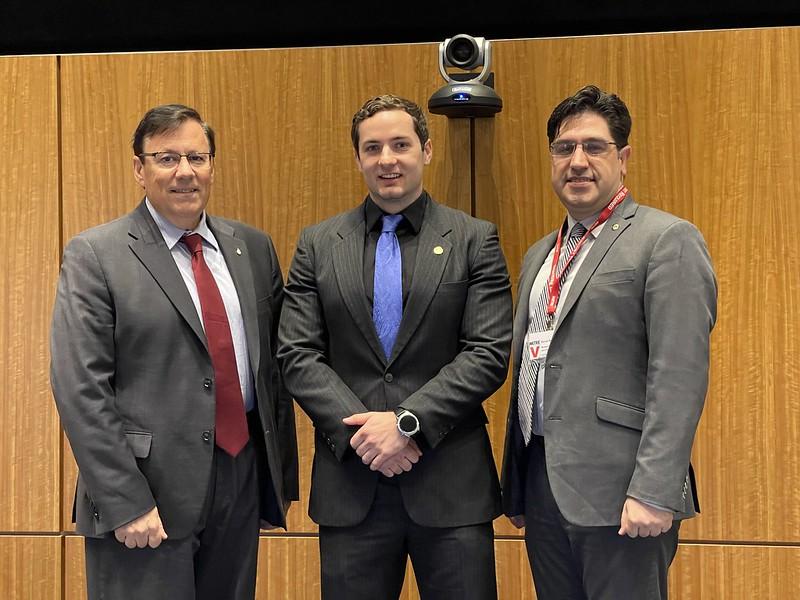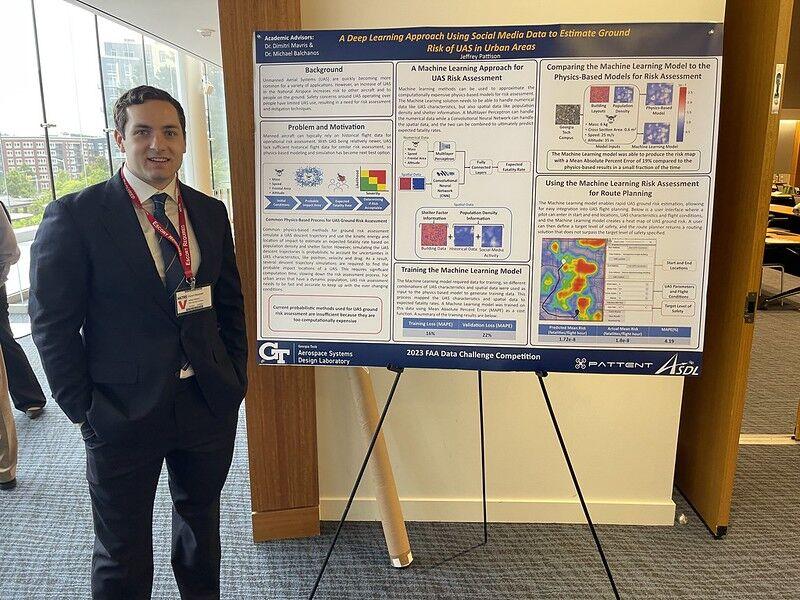Jeffrey Pattison received $25,000 for his research on drone safety in urban areas.
Aerospace engineering Ph.D. candidate Jeffrey Pattison, MSAE 2019 won first place and $25,000 in the 2023 Federal Aviation Administration (FAA) Data Challenge for his research on improving drone safety in urban areas. This year’s challenge focused on using artificial intelligence, machine learning, and advanced analytics to explore aviation-related problems and opportunities.
The FAA Data Challenge provides a unique opportunity to involve university students in the FAA’s mission by offering creative and unique solutions to current and future challenges.
Driven by a passion for engineering from an early age, Pattison found his niche in unpiloted aerial systems (UAS) during his undergraduate studies at Michigan State University, where he completed his bachelor’s degree in mechanical engineering.

Dimitri Mavris, Jeffrey Pattison, and Michael Balchanos
His love of engineering combined with his curiosity of UAS led him to pursue a master’s degree in aerospace engineering at Georgia Tech. Today, he is completing the doctoral program requirements and conducting UAS research win the Aerospace Systems Design Lab (ASDL) with advisors Dimitri Mavris and Michael Balchanos.
“My research is focused on how to better incorporate safety into first responder drone missions. Police are beginning to use drones more and more to respond to emergencies, so my doctoral work is focused on how to quickly determine the risk drones pose to people on the ground while the drones fly overhead,” he shared.
Pattison’s work grew out of related research at the Aerospace System Design Laboratory where he is a graduate research assistant. “The number of use cases for unmanned aerial systems (UAS) has been rapidly growing, and with it the safety concerns and the need for managing risk. The novelty in this work is in the definition of a data fusion approach with machine learning, and the use of available real-time, dynamic data to ensure effective decisions for planning routes for drones so they can be operated safely,” explained Balchanos, ASDL research engineer. Mavris added that “ASDL’s long-standing partnership with the Georgia Tech Police Department has been instrumental in pursuing this concept and the vision for safe utilization of UAS for enabling campus-wide situational awareness and rapid emergency response.”

Jeffrey Pattison poses with his award winning research poster during the competition
Pattison’s competition submission, A Deep Learning Approach Using Social Media Data to Estimate Ground Risk of UAS in Urban Areas, addresses the need for risk evaluation for UAS operations to safely operate over people in urban areas. With UAS being introduced into the airspace recently, there is insufficient flight data for UAS to make similar risk assessments as is done for crewed aircraft. For this reason, modeling and simulation has become the best way to estimate UAS risk.
Pattison applied a physics-based modeling and simulation method to approximate UAS risk, which helps generate training data so that a machine learning algorithm can approximate the UAS risk in a more time-efficient manner. He incorporated building and historical data of population density information along with social media activity to gather spatial data. Pattison then used this machine learning algorithm to estimate UAS risk to people on the ground, which can be used to find high-risk areas to avoid when planning UAS routes.
Pattison created a startup, Pattent LLC, in 2021, using his doctoral work as the foundation. Pattent combines social media activity with patent-pending machine learning technology to estimate risk and create safe UAS routes through highly populated areas so pilots can improve the safety of their operations. He plans on graduating this fall and ultimately returning to the world of entrepreneurship.
“It is an incredible honor and privilege to be selected as the first-place winner and recognized by the FAA. There were many tremendous teams with their own incredible solutions, so I feel very blessed to have won. My goal is to commercialize my research with my startup company, so having the weight of the FAA behind me makes a huge difference,” said Pattison.